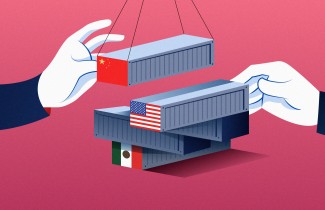How to Fight Pervasive Informality in Emerging Economies
Un nuevo estudio revela vínculos complejos Complex links to institutions and inequality are revealed in a new study instituciones y desigualdad

In emerging markets and frontier economies, much of daily economic life operates outside formal legal and regulatory systems in the informal sector. According to some estimates, informal activity accounts for 25-75% of employment, GDP, and businesses in the developing world. In Mexico, according to the National Occupation and Employment Survey, 32 million Mexicans work in an informal or shadow economy, accounting for 55% of the country’s working population.
During the Covid-19 pandemic, the rate of informality dropped, but since 2021 job recovery in Latin America has been driven by growth in the informal employment, according to the International Labour Organization (ILO), which called to adopt a regional agenda of “comprehensive, consensual and wide-ranging human-centred policies, to support the creation of formal employment, protect the micro- and small enterprises, and support the income of workers and families in vulnerable conditions.” In mid-2023, the average labor market informality in the region stood at 48%, with some countries exceeding 70% (ILO, 2023).
Understanding what perpetuates widespread informality is crucial to promoting equitable growth. An informal economy is often associated with poverty, low productivity, growth, and high unemployment. However, it is also a source of income for people who cannot find a job otherwise or need to complement their employment in the formal sector with extra income.
However, intricate drivers of informality remain poorly understood. An exploratory analysis of 48 emerging economies from 2013-2018 has uncovered nuanced relationships between informality, institutional quality, and systemic inequality.
Using cutting-edge statistical techniques, a study recently published in the paper “Exploratory analysis of the determinants of informality in emerging and frontier economies: an institutional approach via PLS-SEM” (Development Studies Research, 2024) explores how property rights protection, public fund oversight, government transparency, and deeper systemic conditions influence informal activity levels across regions.
Institutional quality vs Systemic drivers
These results confirm that robust institutional quality limits informality. Weak property rights regimes and high public fund diversion open doors for underground transactions, whereas opacity around policymaking fuels uncertainty.
However, systemic conditions, such as state legitimacy, entrenched inequality, and factionalized elites, have an even stronger association with informality. Poor systemic foundations erode institutional quality while directly contributing to underground activities.
For example, illegitimate states breed instability for formal ventures, inequities restrict market access, and cronyism warps policies. Critically, 13.25% of the impact of systemic factors on informality runs indirectly through deteriorating institutions. This highlights the complex interplay between extractive systems, poor governance, and informal behavior.
Regional variations
Intriguingly, drivers and dynamics differ across geographies. In Latin America, inequality and state legitimacy dominate, whereas in Asia, elite factions and property rights protections are prime informality determinants.
Such geographical discrepancies likely reflect varied developmental trajectories, colonial legacies, resource endowments, and political economies. More regionally targeted research could unpack the distinct informalization pathways.
Priority Areas for Policymakers
For policymakers, the analysis highlights priority areas. Systemic deficiencies in state legitimacy and inequality are pivotal indirect and direct informality contributors that merit urgent attention. Combatting public fund diversion could also pay significant dividends, given poor current performance.
This study highlights institutions’ specific mechanisms for fostering equitable property rights, accountability, and fairness in order to combat informality. The results elucidate the concrete institutional channels that policies could target for greater formalization.
Dual institutional and systemic reforms are implicated given the multidimensional drivers of informality. However, context specificity is critical, given the uniqueness of the regions. There are no blanket solutions for the emerging economies.
While causal claims require further study, these insights provide evidence where it is most needed on the stubborn challenge of informality. With nuanced drivers elucidated, more targeted policies can be developed to formalize transactions, raise tax revenues, improve protection, and unlock prosperity.
The author is professor of the Departament of Strategy and Leadership at EGADE Business School.



